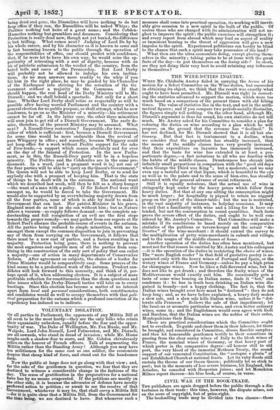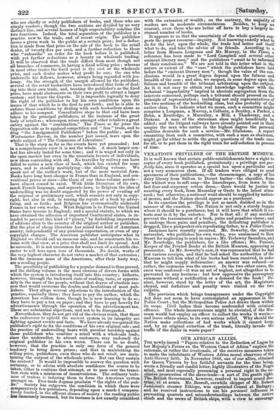CIVIL WAR IN THE BOOK-TRADE.
THE publishers are again dragged before the public through a dis- turbance in their trade this time, however, the dispute arises, not on the score of copyright, but of price-right.
The bookselling trade may be divided into two classes—those
who are chiefly or solely publishers of books, and those who are simply vendors; though the two sections are divided by no very distinct line, and several houses of high respectability combine the two functions. Indeed, the total separation of the publisher is a practice new to the trade, and of recent origin. The publisher manes a given work to the public at a certain price ; but a deduc- tion is made from that price on the sale of the book to the retail dealer, of twenty-five per cent, and a further reduction to those who "subscribe" an order for the book before it is published, with yet further reductions as a bounty on wholesale trading. It will be observed that the trade differs from most though not all branches of commerce, in having a fixed selling price ; whereas in most other trades the fixed point is the cost or the wholesale price, and each dealer makes what profit he can; the one who undersells his fellows, however, always being regarded with jea- lousy. On the strength of the margin allowed by the publisher, several of the retail booksellers have introduced that form of deal- ing into their own trade, and, treating the publisher's as the fixed price, have made abatements on their own profit to attract a larger custom ; and hence the dispute. It is impossible logically to deny the right of the publisher to lay his own conditions upon the issues of that which he is the first to put forth ; and he is able to enforce those conditions by dealing with such booksellers alone as adhere to his compact- Consultative steps to that end have been taken by the principal publishers, at the instance of the great body of retailers; whereupon arises amongst .other retailers a great outcry against the "combination." The Tames so far joins the Opposition side as to applaud competition and " free " trade, and to drag "the Amalgamated Publishers" before the public ; and the Westminster Review, in the number just issued, tears open the whole subject of "The Commerce of Literature." That is the story as far as the events have yet proceeded ; but in a comprehensive view it is not the whole. A much larger con- test has already lasted for some time; and it is waged not only in the open market but even in the uncertain breasts of individuals, new ideas contending with old. No traveller by railway can have failed to notice a new class of book, which has existed for some years, and is steadily multiplying—the shilling volume. We sneak not of the author's work, but of the mere material form. looks have long been cheaper in France than in England, and con- ventional prices or sizes—like those of our three-volume novels— have almost ceased to exist. With little literature of its own, much French language, and separate laws, to Belgium the idea of underselling was no doubt suggested by the power of evading all the original or preliminary cost, which consists not only in copy- right, but also in risk, in raising the repute of a book by adver- tising, and so forth ; and Belgium has systematically undersold France in her own works. What Belgium is to France the United States have become to England; and a special statute, to which we have obtained the adhesion of important Continental states, is in- tended to prevent this kind of" piracy," by forbidding importation of editions alien to the country of the original author or publisher. But the plan of cheap literature has seized fast hold of American society, independently of any piratical exportation, or even of any copyright charges. The American publisher anticipates what in England we should call an immense sale, and he constructs his vo- lume with that view, at a price that shall not limit its spread. And be succeeds. It is not uncommon for works even of a scientific cha- racter to sell tens upon tens of thousands. No doubt, works of the very highest character do not enter a market of that extension; but the immense mass of the Americans, after their hasty way, are a reading people. The possibility of publishing for a popular demand is thus proved, and the shilling volume is the most obvious of divers forms with which the system is introducing itself into this country; hitherto, however, through the backward state of reading, taste, or opportu- nity in the mass of the people, without that degree of absolute ene- mas that would overcome the doubts and hesitations of most pub- lishers. They allege several objections to the introduction of the practice, especially three : they have to pay the author, which the American has seldom done, though he is now learning to do so ; they have to pay a tax on paper; and they have to pay heavily for advertisements through the operation of the advertisement-tax. These are substantial objections, and not to be disregarded. Nevertheless, they do not get rid of the obvious truth, that those who endeavour to uphold the ancient system in its integrity are fighting against events and facts. We have already recognized the publisher's right to fix the conditions of his own original sale ; and the practice of underselling bears with peculiar hardship against those publishers who combine a retail with a wholesale trade, since the underseller, to attract customers, may undersell the original publisher in his own wares. There can be no doubt, however, that the practice is only one form of the general tendency to bring down prices; and that in maintaining the selling price, publishers, even those who do not retail, are main- taining the outpost of the wholesale price.' But can they sustain the contest ? It would be impossible to answer the question with certainty, or to advise with absolute confidence the course to be taken, either to continue that attempt, or to pass over the transi- tion state with a minimum of inconvenience. The ordinary 'cute- ness of traders is inducing them to force the American system amongst us. Free-trade dogmas proclaim "the rights of the pub- lic." Society has outgrown the condition in which there were comparatively few publishers' depending upon a mark, t compara- tively limited, in the affluent classes of society : the reading public las immensely increased, but its increase is not exactly coincident with the extension of wealth ; on the contrary, the majority of readers are in moderate circumstances. Besides, to keep au courant, even those who are better off have to buy a largely in- creased number of books.
It appears to us that the uncertainty of the whole question sug.. gests tho proper recourse—inquiry. Not knowing exactly what to do for the best upon the whole, the trade had better ask itself what to do, and take the advice of its friends. According to a letter from Messrs. Longman and Mr. Murray, in the Times, a reference has been made to "Lord Campbell and several other eminent literary men," and the publishers "await to be informed of their conclusions." We are not told in this letter what is the nature or extent of the " case " which the publishers have laid before the "eminent literary men"; though the value of the con- clusions would in a great degree depend upon the fulness and breadth of the case; and also, we suspect, in some degree upon the fulness and breadth of the tribunal arbitrating upon the subject. As it is not easy to obtain real knowledge together with the technical " impartiality " implied in absolute segregation from the interests concerned, perhaps such a tribunal should proceed on the principle of representation ; including not only representatives of the two sections of the bookselling class, but also probably of the author class. To indicate what we mean, such a committee might comprise a Longman a Murray, a Colburn, a Bentley, a Parker, a Bohn, a Routledge, a Macaulay, a Mill, a Thee eray, and a Dickens. A man of the statesman class might beneficially be added; and the litigant railways have already pointed out in their umpire the man who unites in the highest degree the personal qualities desirable for such a service—Mr. Gladstone. A report emanating from such a committee, with such a man as chairman, might go far either to settle the great questions of the trade once for all, or to put them in the right train for self-solution in process of time.



























 Previous page
Previous page